Sherlock certainly started its fourth season on an eventful note with “The Six Thatchers”, didn’t it? Let’s dig right in.
Recap
Sherlock is called to a top secret meeting. There, we discover the official story for him being out of prison. According to it, a government operative shot Magnussen. Sherlock acts like a brat during the whole meeting. He also says Moriarty is dead, and is playing some posthumous game. Sherlock intends to wait and see what happens. What follows is a montage of scenes of Sherlock investigating different cases, with some of the birth of John and Mary’s daughter as a bonus.
Finally Sherlock comes across one with a smashed bust of Margaret Thatcher. Soon, he discovers there are other cases like this, when burglars broke identical busts. He finds out who has the last one and goes to wait for the burglar. Sherlock catches the criminal red-handed, and discovers that the bust hides an AGRA flash disc, just like the one Mary gave to John. The burglar calls Mary a traitor and promises to kill her. He then manages to leave.
After Mary is told, she tells Sherlock about an operation in Tbilisi where her team of assassins, AGRA, was betrayed. She then disappears to protect her husband and daughter. However, Sherlock stuck a tracker into the flash disc she took with her and so he follows her. The burglar, Ajay, follows Sherlock in turn, and there is a standoff which ends with Ajay dead. Before he dies, he says that he only knows the traitor was ‘the English woman’, not Mary’s name specifically.
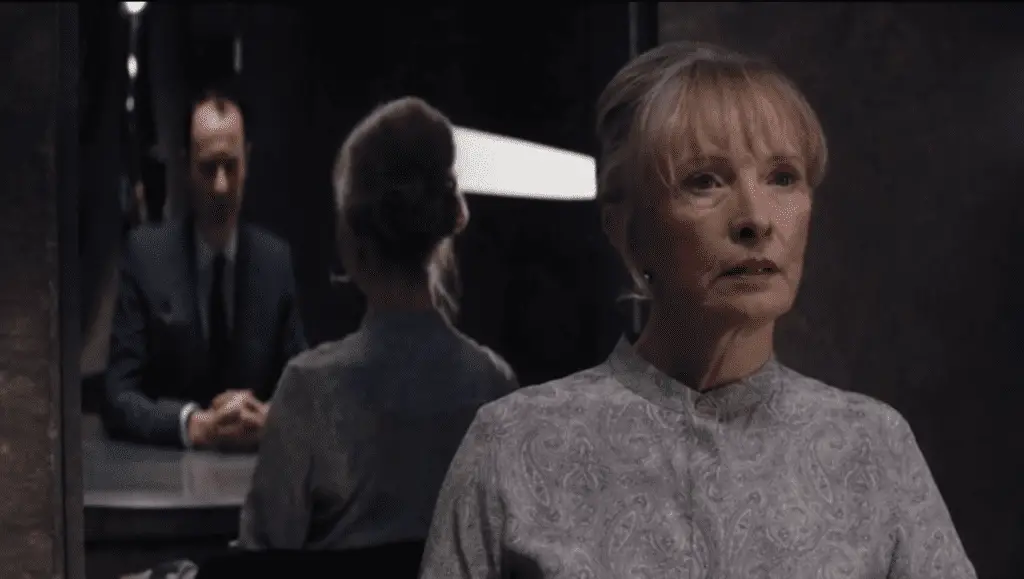 Mary also tells Sherlock the codeword for the operation where they were betrayed was ammo. Sherlock realizes it’s not for ammunition, but for Latin amare, to love. Since that was the code for one of the participants in the secret meeting at the beginning of the episode, Mycroft accuses Lady Smallwood, but she denies her involvement. Sherlock realizes the traitor was actually Vivien the secretary who was, for some mysterious reason, present at the top secret meeting, even though no notes were to be taken there. Secretaries are always taken to top secret meetings with just five people present, didn’t you know?
Mary also tells Sherlock the codeword for the operation where they were betrayed was ammo. Sherlock realizes it’s not for ammunition, but for Latin amare, to love. Since that was the code for one of the participants in the secret meeting at the beginning of the episode, Mycroft accuses Lady Smallwood, but she denies her involvement. Sherlock realizes the traitor was actually Vivien the secretary who was, for some mysterious reason, present at the top secret meeting, even though no notes were to be taken there. Secretaries are always taken to top secret meetings with just five people present, didn’t you know?
Anyway, meanwhile, John and Mary have a bit of a marriage crisis yet again. John is upset Mary left without telling him and also that she lied to him about what AGRA was. She accuses him of being perfect, and we find out that he has, in fact, been having an affair with some random lady. However, as he’s about to tell this to Mary, Sherlock texts them to come to the aquarium, as he’s about to confront the villain of the piece.
Mycroft is called there, too, and the showdown ends with the lady shooting at Sherlock, and Mary jumping in the way of the bullet.
She dies.
In the aftermath, Sherlock is distraught and John is furious with him, because Sherlock “made a vow”. Sherlock also receives a CD from Mary with a message where she asks him to save John.
Oh, and also, Mycroft arranges a meeting with Sherrinford, his other brother.
Review
Before getting to the big event at the end, let’s talk about the rest. Because the thing is, while how the episode ended was hardly pleasing, in some ways, it was the only part that worked.
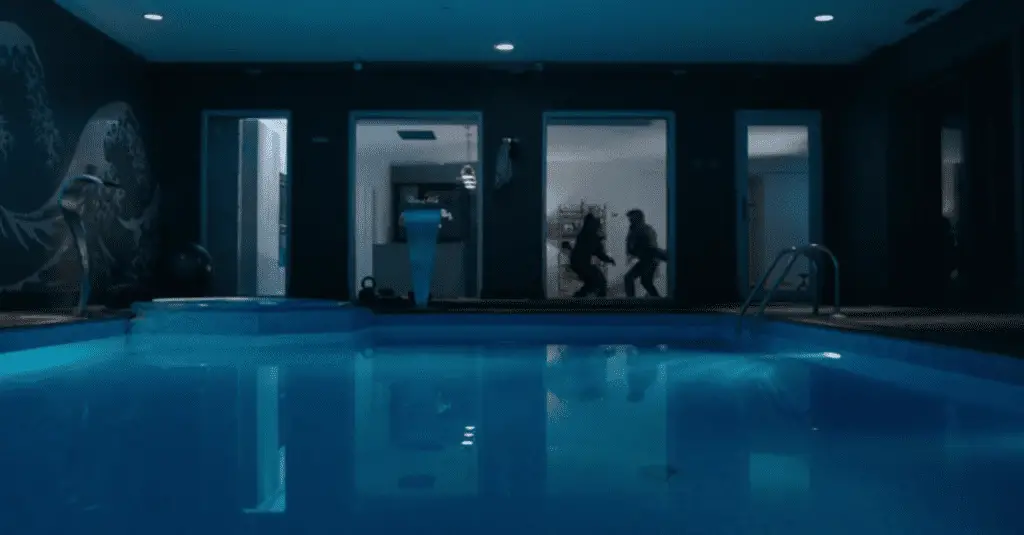 Much of the typical aesthetic of Sherlock is lost in “The Six Thatchers”, and seems to be exchanged for a regular action flick visuals, interchangeable with tens of others. The montage of Mary travelling as she tries to get away from John is probably an intentional reference to James Bond and other spy franchises. That would perhaps be nice as a nod, but not when it hijacks such a large part of the episode. In general, there’s a stench of grimdark about “The Six Thatchers” which it really could have done without. In spite of its ending, or maybe because of it. Had the rest of the episode been happy, the death would have been felt all the more.
Much of the typical aesthetic of Sherlock is lost in “The Six Thatchers”, and seems to be exchanged for a regular action flick visuals, interchangeable with tens of others. The montage of Mary travelling as she tries to get away from John is probably an intentional reference to James Bond and other spy franchises. That would perhaps be nice as a nod, but not when it hijacks such a large part of the episode. In general, there’s a stench of grimdark about “The Six Thatchers” which it really could have done without. In spite of its ending, or maybe because of it. Had the rest of the episode been happy, the death would have been felt all the more.
Some visual aspects of Sherlock are preserved, like texts on screen. Even in this case, though, there is often an overload of them, with several messages and conversation going on at the same time and disrupting the clean visual impression we used to get. For some reason, the creators also decided that melodramatic voiceovers were the thing to do, and we both open and close with them.
Let me tell you, the only case when you should use voiceovers is if you’re making a Philip Marlowe adaptation.
Equally mystifying to me was the sudden copious use of flashbacks, chiefly from Ajay’s perspective. Normally, we would get flashbacks in Sherlock when he solved a case, watching how it happened, and it worked perfectly. Now there was an overabundance of them, and it disrupted the flow. Perhaps this, too, contributed to feeling like the pace was too quick, especially in the first half of “The Six Thatchers”. Different moments didn’t have enough space to breathe.
As for plot and writing, there are issues too. For one, they went rather overboard with Sherlock’s degree of assholery. There are two good points of comparison for this. Take the scene of the secret meeting at the beginning, and compare it to Sherlock at the Buckingham Palace in season two. Both have him acting with less dignity and seriousness than Mycroft would prefer. But at the Palace, he wasn’t actively boycotting the investigation, he was refusing the honour the place by getting dressed. Rather childish, yes, but they could have actually proceeded with the briefing while he was dressed in a sheet.
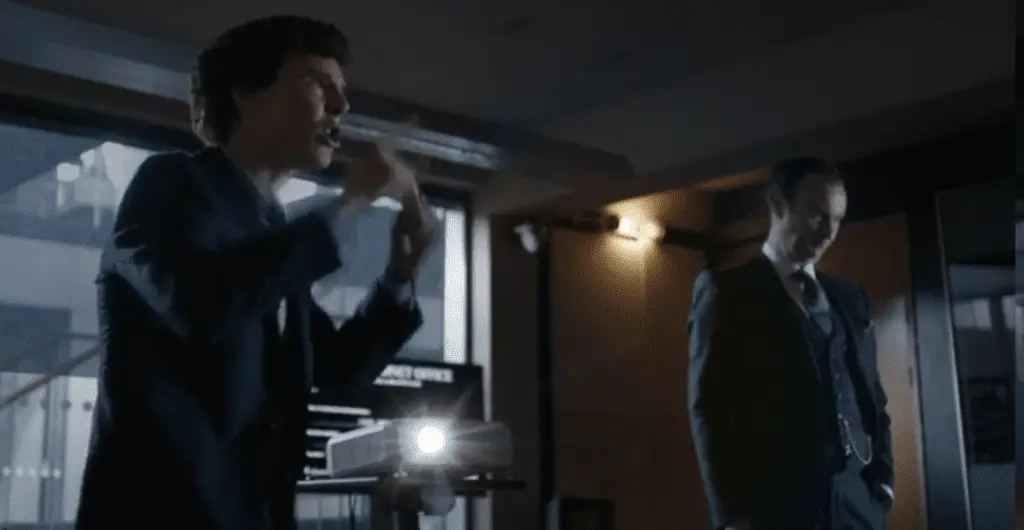 Here, he tweets in the middle of a top secret meeting (people are normally not allowed to have phones at these things, but I guess Mycroft’s brother has his privileges, because Reasons) and then proceeds to disrupt it entirely for no reason at all. If he acted like that, Lestrade would have never started taking him to crime scenes in the first place.
Here, he tweets in the middle of a top secret meeting (people are normally not allowed to have phones at these things, but I guess Mycroft’s brother has his privileges, because Reasons) and then proceeds to disrupt it entirely for no reason at all. If he acted like that, Lestrade would have never started taking him to crime scenes in the first place.
The second comparison is between the baptism of Rosamund and John and Mary’s wedding in season three, and Sherlock’s entire behaviour around it. When John asked Sherlock to be his best man, Sherlock was actually touched, and took the wedding seriously. The only reason he was distracted once there was because there was an actual bona fide murder attempt going on in the middle of the reception. Here, by contrast, Sherlock seems to completely ignore the whole matter, to the point of texting during the baptism ceremony. But hey, great place for product placement!
Sherlock’s and John’s relationship works in a precarious balance. Sherlock is frequently an asshole, but John has managed to make him aware enough that he doesn’t cross a line, or when he does, he apologizes afterwards (see “Hound of the Baskervilles”), and it’s usually because he himself is under some kind of stress. You don’t have to like him or the way he acts, but it’s not with the sort of outright mockery he did in this episode. The same goes for his behaviour towards Mycroft. This Sherlock seemed like he was written by a fanfic author who can’t get the personality quite right, and I have no idea what he was doing in an episode written by Gatiss.
And speaking of mischaracterization, after presenting Mycroft as omniscient and super intelligent for three seasons, it’s a little hard to swallow that he is supposed to have let a mole in his vetted group of three most trustworthy people, just like that. If it was some extremely elaborate plan by another mastermind, fine. This is just inconsistent, however, and its only there because it was the only way they could figure for Sherlock to meet the lady.
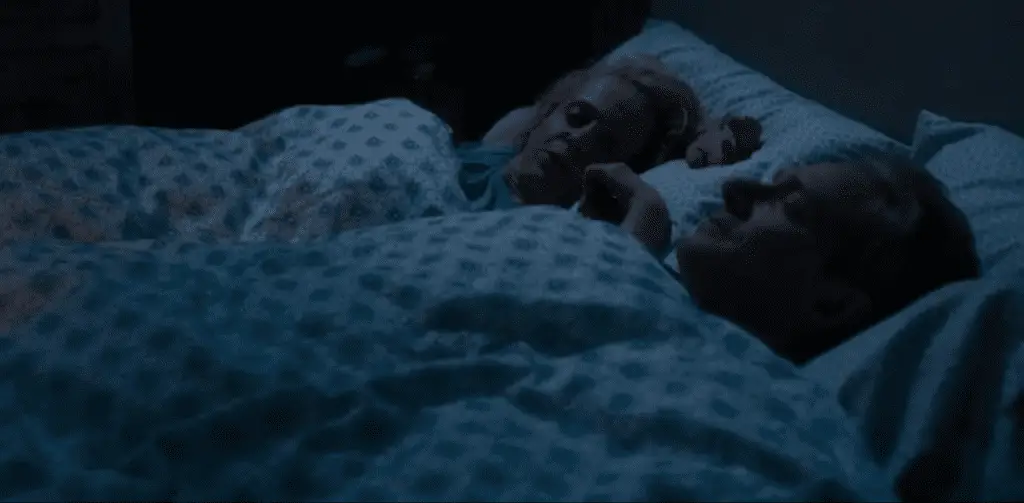 My other objection to this episode is that in places, it seemed to be a different genre altogether. Sometimes it was an action flick, both by its aesthetics, as I’ve already mentioned, and by the plot itself. The long wrestling scene with Ajay was particularly tiresome to me. Sometimes, the genre switched to a family drama. So much attention given to John and Mary’s trouble, which was so uninteresting!
My other objection to this episode is that in places, it seemed to be a different genre altogether. Sometimes it was an action flick, both by its aesthetics, as I’ve already mentioned, and by the plot itself. The long wrestling scene with Ajay was particularly tiresome to me. Sometimes, the genre switched to a family drama. So much attention given to John and Mary’s trouble, which was so uninteresting!
The end makes it obvious why the focus was on them, but it should have been handled better. As I watched “The Six Thatchers”, the only thing I could think was “this again?” Because we’ve already seen John struggle with accepting Mary’s past and then doing so. It’s over and done with, and doing the exact same thing again is boring and bad writing.
It was especially irritating in combination with John’s own “imperfection.” I understand they didn’t want to devote any more time to it. Like I said, there was enough family drama as it was. But also as it was, it was absurd. I’m not saying that fresh fathers are immune to the temptations of infidelity, but John, with his character? Unable to resist a completely unknown woman on the bus who gives him her number? Seriously? That doesn’t mean that “he has flaws too”, that means he’s an outright asshole and a jerk who doesn’t even bother and can’t withstand the most superficial attempt at seduction. This is lazy writing, too. What possible flaw could a man in a marriage have? Oh, I know. He’s unfaithful! No matter his character or personal story, he’s going to have a mistress!
I mean, we all know what John’s flaw in a marriage would be. He would spend too much time with Sherlock and ignore his wife and child. But instead, we got this nonsense.
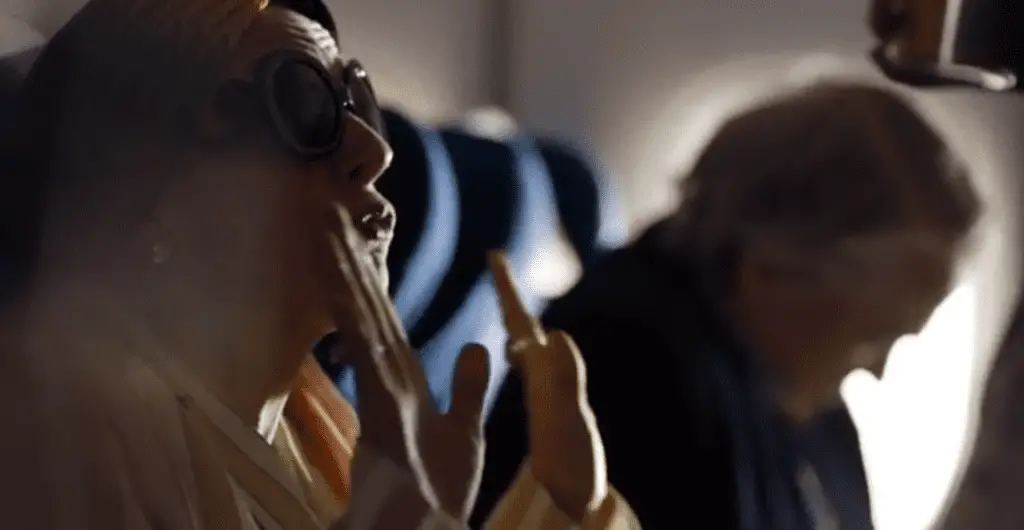 The counterpoint with Mary’s “failing” makes it doubly ridiculous. Her failing was not telling him that AGRA was the acronym of a secret organization, which was probably wise, and then trying to draw a well-trained assassin away from her daughter and husband. His failing was falling into bed with the first pretty face that smiled at him right after his daughter was born. Can’t you see how alike they are?
The counterpoint with Mary’s “failing” makes it doubly ridiculous. Her failing was not telling him that AGRA was the acronym of a secret organization, which was probably wise, and then trying to draw a well-trained assassin away from her daughter and husband. His failing was falling into bed with the first pretty face that smiled at him right after his daughter was born. Can’t you see how alike they are?
And of course, Mary’s temporary sacrifice of her normal life is immediately made useless because Sherlock follows her, thus drawing the aforementioned assassin to her, and that after he swore to protect her. Nice job!
If Mary had died in that confrontation, it would have had great thematic significance. It would have been as a direct result of Sherlock’s arrogance, his confidence that he could protect her. He would have ruined her well-thought out plan to get rid of the man who wanted to kill her (she’s the professional in this, not him), and she’d have died as a result. John’s resentment, too, would have been expected then.
Instead we got…well, it wasn’t quite the Stray Bullet Of Convenience, but something much like it. Mary chose to sacrifice herself, so that gives her some agency I guess. That’s nice.
It would be nicer if it wasn’t for Sherlock, and in such a ridiculously contrived situation.
Just take a look.
Sherlock prepares for a showdown with a person who he knows killed a number of people, even though indirectly. He specifically calls Mary and John to go with him – the people he swore to protect. He also calls Mycroft, whose famed superintelligence and capabilities are in absence once again, as he does nothing. All these people stand there around a woman with a loaded gun who is a known killer and just look at her, and when she raises the gun, the most they manage is “be reasonable”. Sherlock might be too overconfident for this and John too squeamish, but Mary should have shot her down with a gun of her own, not jumped in the way of the bullet. Or, alternately, Mycroft or some of his people should have. Or at least attempted to.
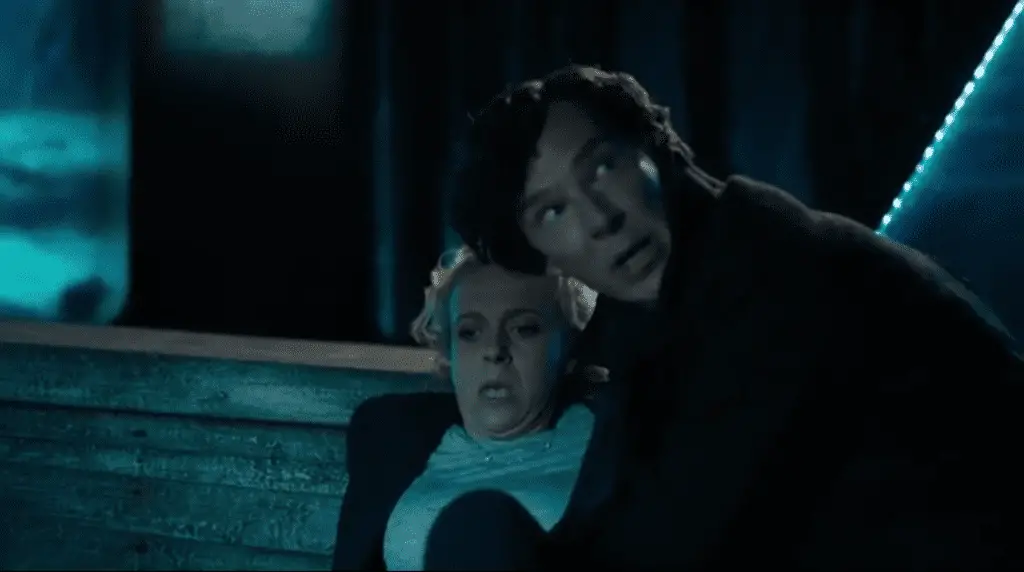 Instead, we have Mary sacrificing herself for Sherlock, the golden protagonist everyone loves.
Instead, we have Mary sacrificing herself for Sherlock, the golden protagonist everyone loves.
I know this is what many people complain about in Sherlock, that’s he’s an arsehole but still everyone likes him and those who don’t are painted like idiots.
Well, this ending took it to the next level.
Of course the only appropriate way for the trained assassin to die is to sacrifice herself for our protagonist! Naturally it can’t be in anything related to her! Of course she can’t go down taking the woman who betrayed her and caused the torture of her three close friends! Oh no. Noble self-sacrifice for our perfect protagonist it is. Didn’t you know that self-sacrifice was the only thing women were good for?
The show probably intended her death to be the result of Sherlock’s overconfidence, but it failed to deliver. Yes, Sherlock goaded the villain and made her angry, but while risky, this was also a strategy that could have worked. It could have decomposed her enough that she’d be unable to act. That didn’t work, and instead she decided to take her anger out on Sherlock. He was fully prepared to accept that, as he stood unmoving in the way of the bullet. That Mary decided to save him by jumping in front of the bullet is not his fault, and it did not happen because of him. It was her choice.
So instead of Sherlock being finally forced to face his failing, we have Mary complicit in her own death, and John unreasonably angry. Not that I blame him, he’s grieving, but it’s very different from justified anger we might have seen had this been written differently.
And then, naturally, there is the cherry on the top in the form of Mary’s last words.
“Being Mary Watson was the only life worth living.”
Sure.
Look, I don’t have a problem with Mary dying as she confesses her love to John. That’s fine. But there are a million ways to phrase this, and the writers intentionally chose the one that erased all identity she had apart from her husband. Maybe they thought they had some feminist points accumulated from last year’s disaster? Sorry, but no.
I don’t blame the writers for killing Mary. It’s canon, after all. It should have been done very differently, though. But then, what do I expect? In their world, the international assassin Mary can’t even call herself a taxi to get to the hospital to give birth. The only thing she can do is call her husband in distress. Seriously.
But in spite of all this, what happened after Mary’s death was the only thing that truly worked in the entire episode. Sherlock’s emotion was almost tangible, and so was John’s anger and shame. It was well handled. I particularly liked how they showed Sherlock’s lack of coping mechanisms, and his inability to as much as talk to a therapist. Even the fact that they showed him going there is a great way to illustrate how distraught he is. We all know he would never go normally. Everything he does shows he is out of sorts in an excellent way.
Mycroft’s meeting with Sherrinford might or might not be related to this, but at any rate, I am intrigued. I mean, I’m disappointed he’s alive. I had such a nice theory about his death, too! But still, I am intrigued.
It’s a good thing, too, because after such a disappointing episode, I really needed at least some motivation to look forward to the next one. Hopefully, it will be more like the old Sherlock we know and love.

